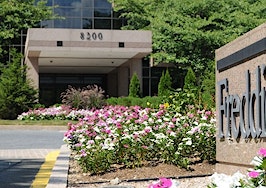Mortgage rates dipped for the second consecutive week following a disappointing jobs report.
Rates on 30-year fixed-rate mortgages averaged 3.43 percent with an average 0.8 point for the week ending April 11, down from 3.54 percent last week and 3.88 percent a year ago, Freddie Mac said in releasing the results of its latest Primary Mortgage Market Survey. Rates on 30-year fixed-rate loans hit a low in Freddie Mac records dating to 1971 of 3.31 percent during the week ending Nov. 21, 2012.
For 15-year fixed-rate mortgages, rates averaged 2.65 percent with an average 0.7 point, down from 2.74 percent last week and 3.11 percent a year ago. Rates on 15-year fixed-rate loans hit a low in Freddie Mac records dating to 1991 of 2.63 percent during the week ending Nov. 21, 2012.
For five-year Treasury-indexed hybrid-rate mortgage (ARM) loans, rates averaged 2.62 percent with an average 0.5 point, down from 2.65 percent last week and 2.85 percent a year earlier. Rates on five-year Treasury-indexed hybrid-rate mortgage (ARM) loans hit an all-time low in records dating to 2005 of 2.61 percent during the week ending March 21.
Rates on one-year Treasury-indexed ARM loans averaged 2.62 percent with an average 0.3 point, down from 2.63 percent last week and 2.8 percent a year ago. Rates on one-year ARM loans hit a low in records dating to 1984 of 2.52 percent during the week ending Dec. 20, 2012.
Looking back a week, a separate survey by the Mortgage Bankers Association showed applications for purchase loans down a seasonally adjusted 1 percent during the week ending April 5 from the week before. Purchase applications were up 4 percent from a year ago.
The drop in mortgage rates followed a jobs report released last week that showed that the economy added 88,000 nonfarm-payroll jobs to the economy in March. That was somewhere around half the number of jobs that many economists expected to sprout last month. And it fell far short of the average monthly gain of 169,000 jobs recorded over the 12-month period preceding March.








